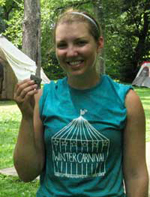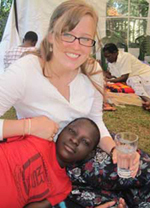Whether they work with hospice patients in Uganda or study stone artifacts in Illinois, anthropology students like Elise Alonzi and Hanna O’Brien who pursue fieldwork can gain valuable experience and discover their personal passions within the discipline.
“It’s important for students to get involved in research, service, and experiential learning both on and off campus,” says Deb Rotman, director of undergraduate studies for Notre Dame’s Department of Anthropology. “The skills and knowledge that are developed in research are critical not only to a dynamic undergraduate education or senior thesis, but these kinds of active engagement make students incredibly compelling candidates for graduate school, professional school, or post-baccalaureate employment.”
Digging into History

“Fieldwork isn’t for everybody,” says Alonzi, a junior majoring in environmental science and anthropology. “But, my first-year advisor really encouraged me to explore my options, to try new things. So, I thought I’d try a summer dig.”
Alonzi spent two months in the summer after her freshman year studying Paleo-Indian stone artifacts at two sites in Illinois. “The site near Moline focused on surveying and plotting a field where some 9,000-year-old ‘lithics’ [stone tools] were found,” she says. “Things were broken and burned, and there was a lot of surface scatter.
“The second site, near Dekalb, was a ‘retouching site’ where tools were made or repaired,” Alonzi says. “It was an old site, so there weren’t any features to plot. The work was all about sifting for rock chips as small as one square centimeter.”
Now aiming for a career in archeology, Alonzi says it was that first summer experience that got her hooked on fieldwork. She has since done more Paleo-Indian work in Department Chair and Professor Mark Schurr’s field program and spent last summer working on an excavation of a medieval abbey near Dublin, Ireland, under Associate Professor Meredith Chesson.
“The anthropology department has so many opportunities for fieldwork and CUSE [Center for Undergraduate Scholarly Engagement] has resources that help you get there,” Alonzi says.
Exploring Cultures

Embracing new opportunities in her first year helped Hanna O’Brien find her path, too. “I didn’t get all the classes that I thought I wanted for the fall of my first year,” she says. “So, I registered for Introduction to Anthropology with Professor [Ian] Kuijt—and I fell in love with anthropology. In the second semester, I ‘went out on a limb’ again, taking a University Seminar called Phenomena of Iranian Cinema with Professor [Jill] Godmilow. … Both of these experiences made me realize that my passion is studying the world’s many cultures.”
Now a junior majoring in pre-professional studies and anthropology, O’Brien is focused on a future in medical anthropology. She spent last summer in Uganda working on a self-designed field project on hospice and palliative care with the Palliative Care Association of Uganda under the mentorship of Vania Smith-Oka, the Nancy O’Neill Assistant Professor of Anthropology.
“Experiencing Ugandan palliative care helped me gain an understanding of the relationship between Western medicine and African culture,” O’Brien explains. “The cultural understanding of death that a patient and the patient’s family have is really important in palliative care.”
O’Brien worked at Hospice Africa Uganda, Hospice Jinja, and the Cancer Institute Children’s Ward in Kampala Mulago, and visited a traditional healing school, Prometra Uganda, in the Buyijja Forest. When she returns from her semester abroad in London, she will begin work with the Kellogg Institute for International Studies to establish and promote her field project as a permanent internship for Notre Dame students.
“It was a lot of hard work to put together my field project and apply for the Kellogg Experiencing the World Fellowship, but it was all worth it,” she says. “Notre Dame has incredible resources to support student research interests.”


